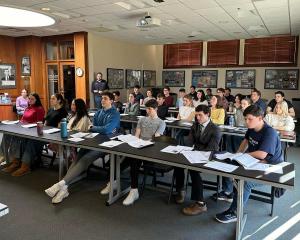Welcome to the Hilltop
Since 1889, Saint Anselm College has provided a transformative education shaped by Catholic and Benedictine values and a liberal arts foundation. Here, you are part of a welcoming community where you will discover your passions, experience cherished traditions, and unlock your full potential.
Top100.00100
national liberal arts college by Forbes
99.0099%
of identified graduates of the class of 2023 are either employed, pursuing further education, serving in the military, or volunteering
#24.0024
most engaged in community service by Princeton Review

Celebrating 50 Years of Women’s Education
This year marks 50 years of women’s education and achievements at Saint Anselm College. To commemorate this extraordinary milestone, the college is celebrating with events and programs centered around the women of the past and present who have made Saint Anselm College what it is today.
Meet Our Anselmians

"I believe with all my heart that today’s world needs Saint Anselm College, a place that is infused with the Catholic and Benedictine values of community, hospitality and love, where the humanities, arts and sciences and professional programs like nursing, criminal justice and business build on our liberal arts core rather than compete with it. We need a place where you don’t have to choose between career outcomes and life outcomes. That place is Saint Anselm."
In the classroom and in the community, an Anselmian education will challenge you to find your best self.
Anselmian News

Interdisciplinary Special Topics Course is “Unlike Any Other”
Last fall, a new special topics course blended history and literature in a…

Anselmians Make Record Gifts to Support Saint Anselm College Now and Always
During the 10th annual Days of Giving campaign, the college a record $1.43…

Saint Anselm students play role in President Biden’s NH visit
Students reflect on the important role they played in President Biden’s…

Chapel Arts Center Hosts a Retrospective on long-time Photography Professor
“The Intimacy of Seeing: Elsa Voelcker – A Retrospective,” the current…

Meelia Center's 32nd Annual Valentine's Dance Spreads Love and Inclusion in the Community
The Meelia Center for Community Engagement spread love in the community as…

NHIOP Welcomes 2024 Cohort of Kevin B. Harrington Student Ambassadors
The New Hampshire Institute of Politics welcomes 29 new Student Ambassadors…

Saint Anselm Men’s Basketball Coach Keith Dickson Announces Retirement; Chris Santo ‘15 Named New Head Coach
After 38 years and 719 victories across 37 seasons, Saint Anselm College…

Write-In | April 16 | 7-10 p.m.
Get your writing done in the company of others!
The Academic…

FEATURED FACULTY MEMBER
Theology Professor Ahida Pilarski, Ph.D. was featured in the most recent issue of Portraits Magazine's Focus on Faculty.
"The first program in women’s studies in the United States was approved at San Diego State University in 1970. Saint Anselm College also is celebrating the 50th anniversary of women at the college this year. It is nice to know that our college joined this major change of increasing the access of women to education."

Anselmian Events

Delight is a space where women of all faith backgrounds can come together for supportive conversations about pursuing a relationship with Jesus.
For more information, contact us: CampusMinistry@anselm.edu

President President Favazza and the Diversity & Inclusion Innovation Fund (DIIF) Committee invite you to this annual event that recognizes the efforts made across campus to promote diversity and inclusion through the Diversity and Inclusion Innovation Fund grant program. and the Diversity & Inclusion Innovation Fund (DIIF) Committee invite you to this annual event that recognizes the efforts made across campus to promote diversity and inclusion through the Diversity and Inclusion Innovation Fund grant program.

Mark your calendars for Tuesday, April 23, at 6:00 p.m., as we dive into the write-in Biden effort during the 2024 New Hampshire primary.
Join us for an open discussion with former New Hampshire Democratic Party Chair, Kathy Sullivan. As a nonpartisan Institute committed to educating, engaging, and empowering citizens to participate in their local communities, we're thrilled to welcome everyone to this exciting event!
This is event is hosted by the Kevin B. Harrington Student Ambassadors.
Event details for Write-in Biden: A Discussion of the 2024 NH Primary

Tuesdays at 6:30 p.m.
Starting on March 19, 2024, Geisel will host a weekly Reading Party each on Tuesday evenings at 6:30 p.m. for the remainder of the semester. The last party will be on April 30, 2024.
How it Works
Bring something to read (fiction, non-fiction, textbook, magazine, whatever), or pick something from Geisel's collections. We'll read for a hour or so, silently, as a group in the Reading Room. After one hour you will be invited to share what you've read with the person/s sitting next to you.
Take advantage of this time to read, learn from others, and find out about other great books to read.
Coffee, tea, and cocoa will be provided.
No RSVP required. Attend when you can.
All are welcome!

A-men is a Christian men’s group centered around community and faith. We have weekly meetings on Tuesdays in the lower church conference room from 8-9. During this time, we discuss topics centered around virtue, bible passages, and what it is like to be a Christian male in today's society and culture. A-men is a space for Christian men who want to grow in their relationship with God to come together, learn from each other, and support each other in their journey.
For more information, please email campusministry@anselm.edu

Join us on April 24th for “Leadership, the Social Compact, and the Future of Work,” a conversation with national bestselling author James Rhee and Amanda Grappone. This event is hosted in partnership with the Center for Ethics in Society and the Gregory J. Grappone Humanities Institute.
In kindergarten, James Rhee received a toy red helicopter in gratitude for a simple act of generosity—sharing his lunch. Decades later, the lesson from that small gift led him to develop a human-centered framework for business and personal achievement that helped him overcome seemingly insurmountable hurdles and find unprecedented success.
Together, Grappone and Rhee will discuss key points from his book and share meaningful ways that leadership and kindness can impact the business world.
Event details for Leadership, the Social Compact, and the Future of Work





